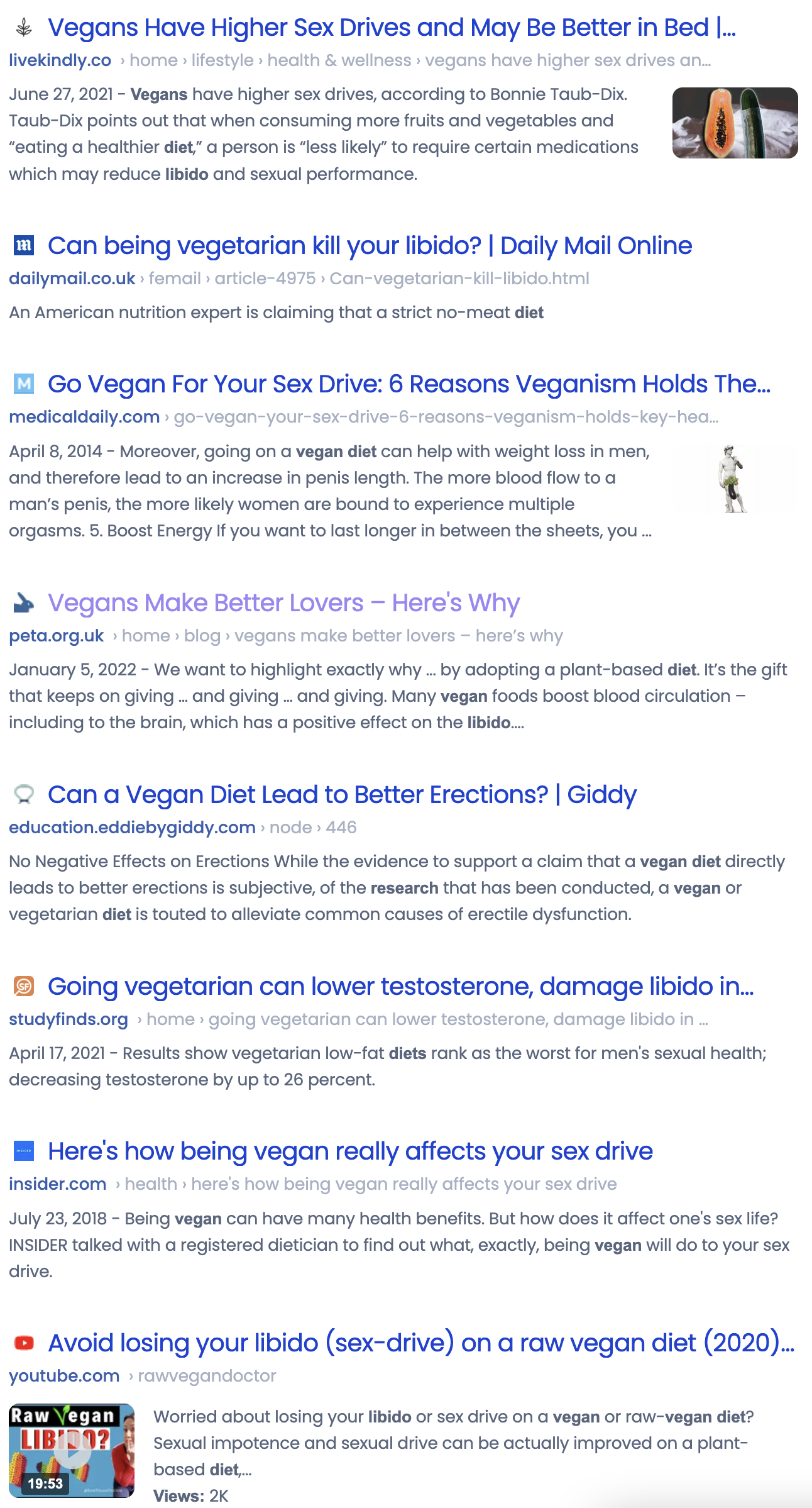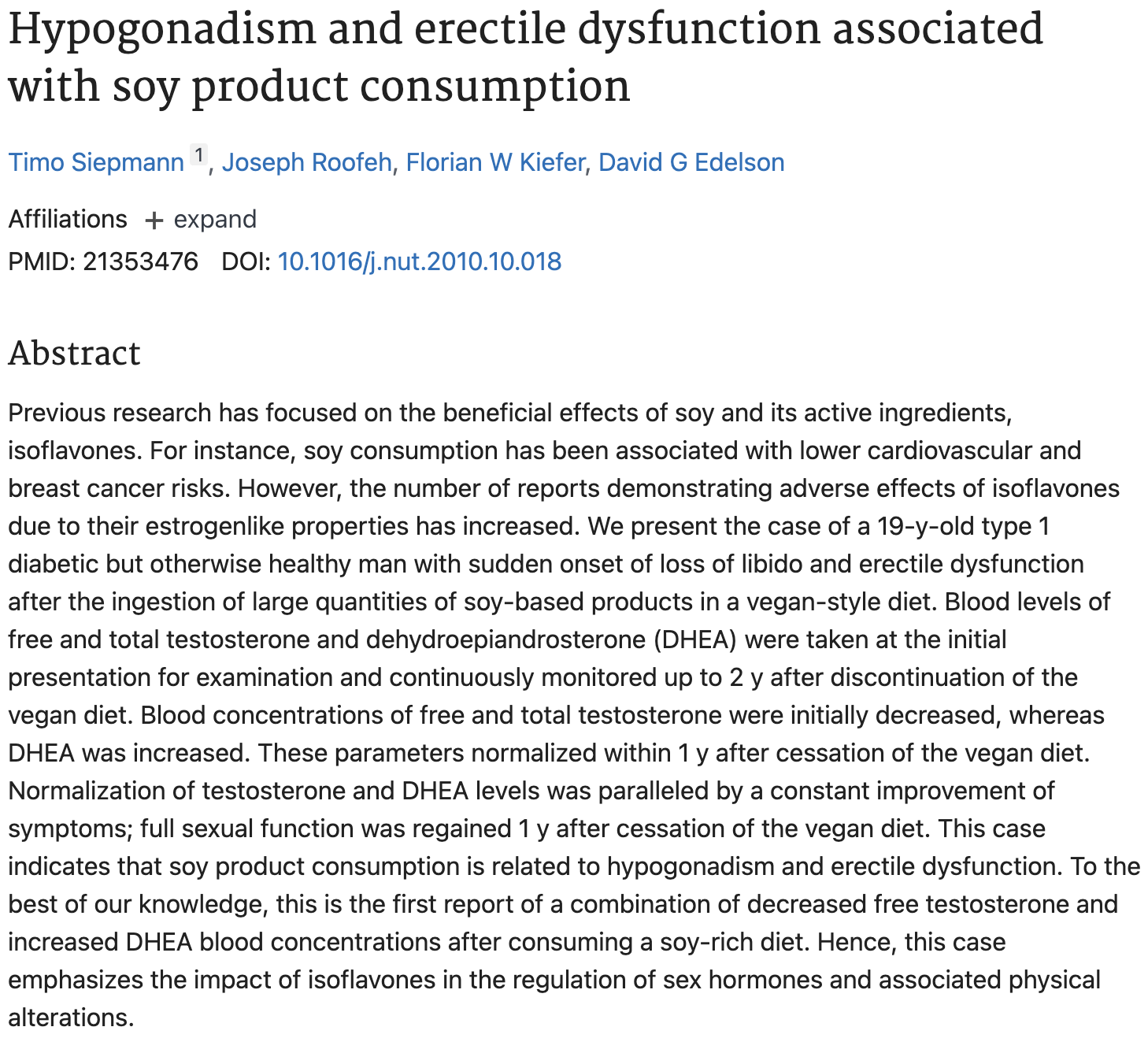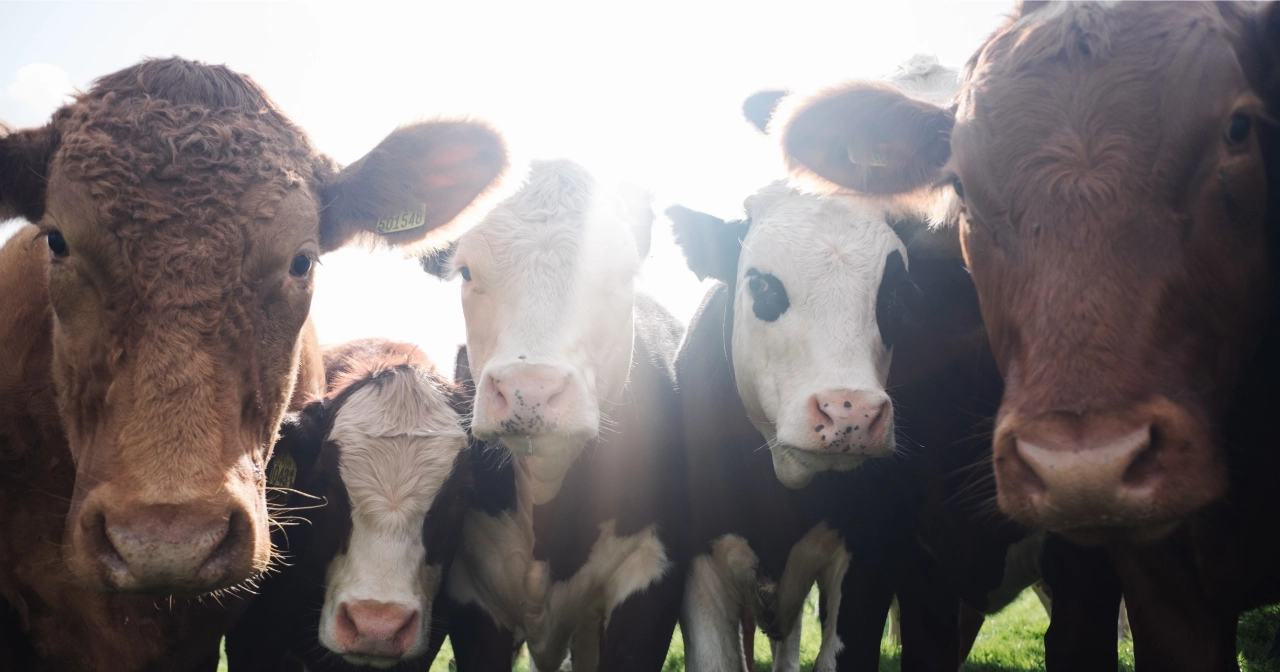Listen on: Apple Podcasts | Spotify
The effort to convert people to plant-based diets is nothing new, but the effort to move people from eating meat to going vegan continues to gain traction.
There are some who wholeheartedly believe a plant-based diet is better for your health than one that includes animal proteins. But those leading the anti-meat agenda likely have goals in mind that aren’t really about your health.
If you could build muscle, maximize bone density, minimize excess body fat, and boost cognitive function by removing meat from an otherwise healthy diet, I’d be the first to jump on board.
However, scientific evidence fails to support any of these benefits. A 2020 systematic review even finds a strong connection between plant-based diets and anxiety and depression.
That’s the topic of this article.
In modern history, Dr. Harvey Kellogg might deserve credit for seeing the power of meat to influence your mind and mood, though it’s probably not the way you might be thinking.
He thought that meat and certain flavorful or seasoned foods increased sexual desire, and that plainer food, especially cereals and nuts, could curb it…Kellogg developed a few different flaked grain breakfast cereals—including corn flakes—as healthy, ready-to-eat, anti-masturbatory morning meals.
Matt Soniak, Corn Flakes Were Part of an Anti-Masturbation Crusade
Think about that the next time you look at a box of Corn Flakes. His anti-meat ideology led to one of the biggest food industry categories: breakfast cereal. Not something I’d recommend starting your day with.
Interestingly, many vegan websites claim that vegans have stronger libidos. For example, here’s the search results of the phrase “research vegan diet libido” from my Brave browser.

As I read through some of the articles, I noticed a total lack of scientific evidence. When I searched PubMed for “vegan diet libido,” I only came up with this paper:

The case study authors stated:
To the best of our knowledge, this is the first report of a combination of decreased free testosterone and increased DHEA blood concentrations after consuming a soy-rich diet. Hence, this case emphasizes the impact of isoflavones in the regulation of sex hormones and associated physical alterations.
Siepmann T, et al.
Obviously, you can follow a vegan diet while avoiding soy, but many vegan foods contain it. So, maybe Dr. Harvey Kellogg was onto something with his belief that a plant-based diet changes your psychology. Then again, this is just a single case study.
That said, libido is just once small (but significant) aspect of mental health. Possibly more important to understand is how a vegan diet affects depression and anxiety. According to the World Health Organization, mental illness is the leading cause of disability in the world. No doubt, they and most countries’ leaders made that problem worse with how they approached the Covid Circus.
Globalists seem intent on moving the population to a plant-based diet out of concerns about climate change. That argument is a whole other controversial topic to address at another time. If you don’t want to wait for some answers on this, I recommend reading Sacred Cow: The Case for (Better) Meat: Why Well-Raised Meat Is Good for You and Good for the Planet.
The question is: how does a plant-based diet affect depression and anxiety? If it makes those mental health problems worse, it would seem that a questionable attempt to save the planet while harming the people would be a bad idea.
Before we get to the effects of a vegan diet on anxiety and depression, I need to back up a bit and discuss how the effects of vegan diets have been assessed and review some of the nutrient gaps they leave behind. Once you understand that, it makes it easier to understand why vegan diets affect mental health the way they do.
What are you comparing a vegan diet to?
When a proponent of a vegetarian diet or vegan diet says “it’s healthier,” you should always ask them, “Compared to what?”
Almost every diet you can come up with is better than the Standard American Diet (SAD), also referred to as a Western Diet.
Research participants that follow a plant-based diet almost always experience improved health compared to those on the SAD, especially in the short-term. That isn’t surprising since the plant-based diet removes some of the same unhealthy foods other diets do.
Studies that attempt to compare long-term vegetarians and vegans to those who’ve always eaten an SAD also see better overall health in those following the plant-based diets. In these studies, what’s often overlooked is the lifestyles the plant-based dieters live. They exercise more, take supplements, are less likely to smoke, and so on.
while it is well-established that the mortality of vegetarians compares positively with the general population , several reports demonstrated that there were no differences in mortality when vegetarians were compared to meat-consumers with similar socio-demographic characteristics.
Dobersek U, et al.
Clearly, we aren’t comparing the difference between those who live a healthy lifestyle and eat meat to those who live a healthy lifestyle and don’t.
As has become blatantly obvious, most reporters and journalists don’t make an effort to understand this. They just run stories that supports a desired narrative and ignore those that don’t.
Read also: Does red meat cause cardiovascular disease or type II diabetes?
What nutrient deficiencies do vegetarian or vegan diets create?
Nutritional supplementation is essential for those who avoid eating animal proteins. Some of the most common nutrient deficiencies they may experience include:
- Calcium
- Iron
- Omega-3 fatty acids
- Vitamin B12
- Vitamin D
- Zinc
Though supplementation in adults may help mitigate some of the effects of these nutrient deficiencies, that may not be the case for children or pregnant women hoping to deliver a healthy baby.
vegetarianism may be associated with serious risks for brain and body development in fetuses and children. Regular supplementation with iron, zinc, and B-12 will not mitigate all of these risks.
Cofnas N.
A study of 1320 people found…
that a vegetarian diet is associated with poorer health (higher incidences of cancer, allergies, and mental health disorders), a higher need for health care, and poorer quality of life.
Burket NT, et al.
Of course, it’s possible that the vegetarian group with the poor health was drawn to a vegetarian diet, rather than the vegetarian diet causing the poor health.
Vegans and vegetarian also have lower bone mineral densities and higher fracture risks than meat eaters.
And, finally, vegetarian and vegan diets tend to be much lower in total protein intake. If you’ve read any of my articles on protein, you know that I’m adamant people eat more protein, not just to improve body composition, but to build and maintain muscle as late in life as possible. Muscle mass has a direct impact on longevity.
Based on the frequency of micronutrient deficiencies, we shouldn’t be surprised that research suggests vegetarian and vegan diets may increase the risk of anxiety and depression.
Read more: Choline Deficiency: One Reason (Of Many) to Avoid a Vegan Diet
Does a plant-based diet improve depression and anxiety, or make it worse?
I’ll get straight to the punchline from a recent systematic review, looking at this question.
Based on this systematic review comprising 160,257 participants from varied geographic regions, including Europe, Asia, North America, and Oceania, aged 11 to 96 years, there is clear evidence that meat-abstention is associated with higher rates or risk of depression, anxiety, and self-harm.
Dobersek U, et al.
In their conclusion, they stated the following:
Higher quality studies suggested that those who abstained from meat consumption had a greater risk or prevalence of depression, anxiety, and self-harm. With respect to clinical practice, the avoidance of meat may be a behavioral marker that signifies poorer mental health.
Dobersek U, et al.
To be clear, there’s a concerted effort to get everyday folks like you and me to stop eating animal protein. The research shows that could lead to some serious cognitive issues.
If I put on a tin hat, I might start thinking that’s the goal. To make us all a little less mentally healthy, and more dependent on those in power. Or, it could be to boost the sales of some of the already top-selling pharmaceuticals. Then again, maybe some people believe so strongly that avoiding animal proteins will save the earth, that they can’t see what it could do to the people living on it.
All I know is, the effort to banish meat, then poultry, then most animal proteins, will get stronger each year. I hope you’ll keep eating animal protein so you maintain the cognitive health to see through what’s going on.

Feel Better Fast. Guaranteed.
Energy+, EDGE, and MentaBiotics make up the Happy Juice supplement stack, with ingredients clinically proven to:
- decrease anxiousness scores by 55%
- decrease irritability scores by 60%
- decrease fatigue by 64%
- decrease anger 54%
- decrease tension by 45%
- decrease confusion by 43%
- decrease overall distress by 49%
- increase good bacteria by 70%
- decrease negative mood by 105%
- increase positive mood by 211%
Photo by Robert Bye on Unsplash
References
Appleby, P., et al. “Comparative Fracture Risk in Vegetarians and Nonvegetarians in EPIC-Oxford.” European Journal of Clinical Nutrition, vol. 61, no. 12, Dec. 2007, pp. 1400–06. PubMed, https://doi.org/10.1038/sj.ejcn.1602659.
Burkert, Nathalie T., et al. “Nutrition and Health – the Association between Eating Behavior and Various Health Parameters: A Matched Sample Study.” PloS One, vol. 9, no. 2, 2014, p. e88278. PubMed, https://doi.org/10.1371/journal.pone.0088278.
“Corn Flakes Were Part of an Anti-Masturbation Crusade.” Mental Floss, https://www.mentalfloss.com/article/32042/corn-flakes-were-invented-part-anti-masturbation-crusade. Accessed 2 Apr. 2022.
Craig, Winston John. “Nutrition Concerns and Health Effects of Vegetarian Diets.” Nutrition in Clinical Practice: Official Publication of the American Society for Parenteral and Enteral Nutrition, vol. 25, no. 6, Dec. 2010, pp. 613–20. PubMed, https://doi.org/10.1177/0884533610385707.
Dobersek, Urska, et al. “Meat and Mental Health: A Systematic Review of Meat Abstention and Depression, Anxiety, and Related Phenomena.” Critical Reviews in Food Science and Nutrition, vol. 61, no. 4, Feb. 2021, pp. 622–35. Taylor and Francis+NEJM, https://doi.org/10.1080/10408398.2020.1741505.
Iguacel, Isabel, et al. “Veganism, Vegetarianism, Bone Mineral Density, and Fracture Risk: A Systematic Review and Meta-Analysis.” Nutrition Reviews, vol. 77, no. 1, Jan. 2019, pp. 1–18. PubMed, https://doi.org/10.1093/nutrit/nuy045.
Melina, Vesanto, et al. “Position of the Academy of Nutrition and Dietetics: Vegetarian Diets.” Journal of the Academy of Nutrition and Dietetics, vol. 116, no. 12, Dec. 2016, pp. 1970–80. PubMed, https://doi.org/10.1016/j.jand.2016.09.025.



